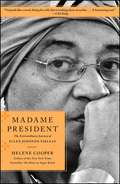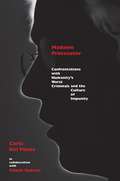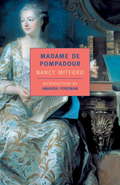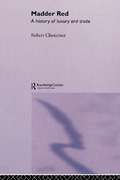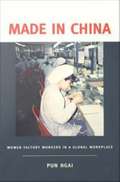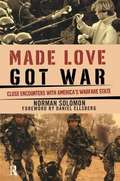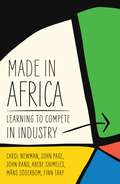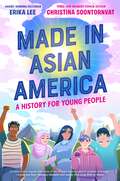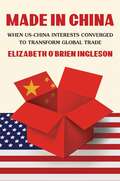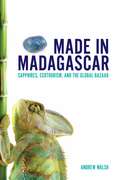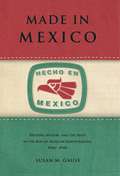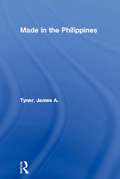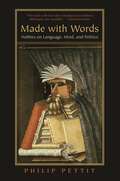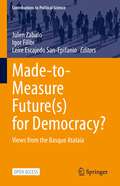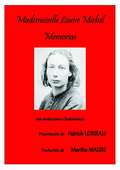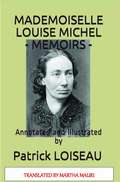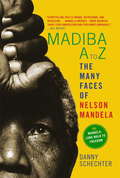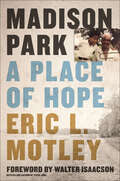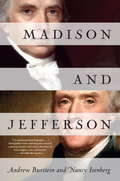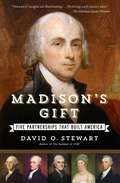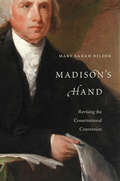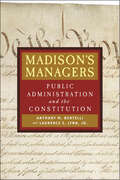- Table View
- List View
Madame President: The Extraordinary Journey of Ellen Johnson Sirleaf
by Helene CooperThe harrowing, but triumphant story of Ellen Johnson Sirleaf, leader of the Liberian women’s movement, winner of the Nobel Peace Prize, and the first democratically elected female president in African history.When Ellen Johnson Sirleaf won the 2005 Liberian presidential election, she demolished a barrier few thought possible, obliterating centuries of patriarchal rule to become the first female elected head of state in Africa’s history. Madame President is the inspiring, often heartbreaking story of Sirleaf’s evolution from an ordinary Liberian mother of four boys to international banking executive, from a victim of domestic violence to a political icon, from a post-war president to a Nobel Peace Prize winner. Pulitzer Prize–winning journalist and bestselling author Helene Cooper deftly weaves Sirleaf’s personal story into the larger narrative of the coming of age of Liberian women. The highs and lows of Sirleaf’s life are filled with indelible images; from imprisonment in a jail cell for standing up to Liberia’s military government to addressing the United States Congress, from reeling under the onslaught of the Ebola pandemic to signing a deal with Hillary Clinton when she was still Secretary of State that enshrined American support for Liberia’s future. Sirleaf’s personality shines throughout this riveting biography. Ultimately, Madame President is the story of Liberia’s greatest daughter, and the universal lessons we can all learn from this “Oracle” of African women.
Madame Prosecutor: Confrontations with Humanity's Worst Criminals and the Culture of Impunity
by Chuck Sudetic Carla Del PonteDel Ponte won international recognition as Switzerland's attorney general when she pursued cases against the Sicilian Mafia. In 1999, she become the chief prosecutor of the International Criminal Tribunal. She offers this courageous and startling memoir of her eight years spent striving to serve justice.
Madame Prosecutor: Confrontations with Humanity's Worst Criminals and the Culture of Impunity
by Chuck Sudetic Carla Del PonteCarla Del Ponte won international recognition as Switzerland's attorney general when she pursued cases against the Sicilian mafia. In 1999, she answered the United Nations' call to become the chief prosecutor of the International Criminal Tribunal for the former Yugoslavia and for Rwanda. In her new role, Del Ponte confronted genocide and crimes against humanity head-on, struggling to bring to justice the highest-ranking individuals responsible for massive acts of violence in Rwanda, Bosnia and Herzegovina, Croatia, and Kosovo.These tribunals have been unprecedented. They operate along the edge of the divide between national sovereignty and international responsibility, in the gray zone between the judicial and the political, a largely unexplored realm for prosecutors and judges. It is a realm whose native inhabitants-political leaders and diplomats, soldiers and spies-assume that they can commit the big crime without being held culpable. It is a realm crisscrossed by what Del Ponte calls the muro di gomma -"the wall of rubber"- a metaphor referring to the tactics government officials use to hide their unwillingness to confront the culture of impunity that has allowed persons responsible for acts of unspeakable, wholesale violence to escape accountability. Madame Prosecutor is Del Ponte's courageous and startling memoir of her eight years spent striving to serve justice.
Madame de Pompadour
by Nancy Mitford Amanda ForemanWhen Madame de Pompadour became the mistress of Louis XV, no one expected her to retain his affections for long. A member of the bourgeoisie rather than an aristocrat, she was physically too cold for the carnal Bourbon king, and had so many enemies that she could not travel publicly without risking a pelting of mud and stones. History has loved her little better. Nancy Mitford's delightfully candid biography re-creates the spirit of eighteenth-century Versailles with its love of pleasure and treachery. We learn that the Queen was a "bore," the Dauphin a "prig," and see France increasingly overcome with class conflict. With a fiction writer's felicity, Mitford restores the royal mistress and celebrates her as a survivor, unsurpassed in "the art of living," who reigned as the most powerful woman in France for nearly twenty years.
Madder Red: A History of Luxury and Trade (Caucasus World)
by Robert ChencinerMadder red is an ancient dyestuff, extracted from the root of the madder plant, growing in many countries around the world. The secret and devilishly complex Oriental dyeing process to obtain the lustrous colour known as Turkey Red was avidly sought by Europeans, from the time before the fall of Ancient Rome. It was finally cracked by the French about 1760, who were able to dye wool, silk and cotton bright red. After the lowlands of the Caspian Caucasus had been subdued by the Russians in the early 1800s, madder was cultivated there and rapidly became the main crop. The quest for Turkey Red went hand in hand with an avalanche of scientific research, which not only improved the yield of dyestuff from the roots but led to its chemical synthesis and in 1870 the collapse of the world-wide madder industry. Many of the nascent dye companies grew into chemical giants of our time. Further regional and cultural background may be found in Chenciner's Daghestan: Tradition and Survival, also published in the Caucasus World series.
Made In China: Women Factory Workers In a Global Workplace
by Pun NgaiAs China has evolved into an industrial powerhouse over the past two decades, a new class of workers has developed: the dagongmei, or working girls. The dagongmei are women in their late teens and early twenties who move from rural areas to urban centers to work in factories. Because of state laws dictating that those born in the countryside cannot permanently leave their villages, and familial pressure for young women to marry by their late twenties, the dagongmei are transient labor. They undertake physically exhausting work in urban factories for an average of four or five years before returning home. The young women are not coerced to work in the factories; they know about the twelve-hour shifts and the hardships of industrial labor. Yet they are still eager to leave home. Made in China is a compelling look at the lives of these women, workers caught between the competing demands of global capitalism, the socialist state, and the patriarchal family. Pun Ngai conducted ethnographic work at an electronics factory in southern China's Guangdong province, in the Shenzhen special economic zone where foreign-owned factories are proliferating. For eight months she slept in the employee dormitories and worked on the shop floor alongside the women whose lives she chronicles. Pun illuminates the workers' perspectives and experiences, describing the lure of consumer desire and especially the minutiae of factory life. She looks at acts of resistance and transgression in the workplace, positing that the chronic pains--such as backaches and headaches--that many of the women experience are as indicative of resistance to oppressive working conditions as they are of defeat. Pun suggests that a silent social revolution is underway in China and that these young migrant workers are its agents.
Made Love, Got War: Close Encounters With America's Warfare State
by Norman Solomon(From the book jacket) LIKE THE REST OF THE BABY-BOOM generation, Norman Solomon grew up in a nation of dazzling progress and ominous shadows. Behind the upbeat TV shows and glib optimism there lurked private anguish and the specter of nuclear holocaust. Young people confronted a divisive war in Vietnam and distress in their own lives. Now, several decades later, Americans face similar divisions and a potentially endless "war on terror." Blending personal history and social commentary, Made Love, Got War documents five decades of rising American militarism and the media's all-too-frequent failure to challenge it. The author's unique weave of eyewitness narrative and historical inquiry, Daniel Ellsberg notes in the foreword, "helps us understand where we are now and how we got here."
Made in Africa: Learning to Compete in Industry
by John Page Abebe Shimeles Carol Newman John Rand Mans Soderbom Finn TarpThe role of industry in low income countries is important. Industry is good for growth, job creation, and poverty reduction. All of these factors depend on the size and the rate of growth of industry. Africa doesn't have enough industry to reach the Sustainable Development Goals for growth, job creation, and poverty reduction. Africa's share of global manufacturing has fallen from about three percent in 1970 to less than two percent in 2010. Why is there so little industry in Africa? Made in Africa: Learning to Compete in Industry outlines a new industrialization strategy to help Africa compete in global markets. This book draws on case study and qualitative research from Africa and emerging Asia to understand what drives firm-level productivity in low income countries. The results show that while traditional concerns such as infrastructure, skills, and the regulatory environment are important, they alone will not be sufficient for Africa to industrialize. The book also addresses how industrialization strategies willneed to adapt to the region's growing resource abundance.
Made in Asian America: A History for Young People
by Erika Lee Christina SoontornvatFrom three-time Newbery Honoree Christina Soontornvat and award-winning historian Erika Lee comes a middle grade nonfiction that shines a light on the generations of Asian Americans who have transformed the United States and who continue to shape what it means to be American.Asian American history is not made up of one single story. It’s many. And it’s a story that too often goes untold. It begins centuries before America even exists as a nation. It is connected to the histories of Western conquest and colonialism. It’s a story of migration; of people and families crossing the Pacific Ocean in search of escape, opportunity, and new beginnings.It is also the story of race and racism. Of being labeled an immigrant invasion, unfit to become citizens, and being banned, deported, and incarcerated. Of being blamed for bringing diseases into the country.It is also a story of bravery and hope. It is the story of heroes who fought for equality in the courts, on the streets, and in the schools, and who continue to fight in solidarity with others doing the same.This book is a stirring account of the ordinary people and extraordinary acts that made Asian America and the young people who are remaking America today.
Made in Brooklyn: Artists, Hipsters, Makers, and Gentrification
by Amanda WasielewskiMade in Brooklyn provides a belated critique of the Maker Movement: from its origins in the nineteenth century to its impact on labor and its entanglement in the neoliberal economic model of the tech industry. This critique is rooted in a case study of one neighborhood in Brooklyn, where artists occupy former factory buildings as makers. Although the Maker Movement promises to revitalize the city and its dying industrial infrastructure by remaking these areas as centers of small-scale production, it often falls short of its utopian ideals. Through her analysis of the Maker Movement, the author addresses broader questions around the nature of artistic work after the internet, as well as what the term &‘hipster&’ means in the context of youth culture, gentrification, labor, and the influence of the internet. Part history, part ethnography, this book is an attempt to provide a unified analysis of how the tech industry has infiltrated artistic practice and urban space.
Made in China: When US-China Interests Converged to Transform Global Trade
by Elizabeth O’Brien InglesonThe surprising story of how Cold War foes found common cause in transforming China’s economy into a source of cheap labor, creating the economic interdependence that characterizes our world today.For centuries, the vastness of the Chinese market tempted foreign companies in search of customers. But in the 1970s, when the United States and China ended two decades of Cold War isolation, China’s trade relations veered in a very different direction. Elizabeth Ingleson shows how the interests of US business and the Chinese state aligned to reframe the China market: the old dream of plentiful customers gave way to a new vision of low-cost workers by the hundreds of millions. In the process, the world’s largest communist state became an indispensable component of global capitalism.Drawing on Chinese- and English-language sources, including previously unexplored corporate papers, Ingleson traces this transformation to the actions of Chinese policymakers, US diplomats, maverick entrepreneurs, Chinese American traders, and executives from major US corporations including Boeing, Westinghouse, J. C. Penney, and Chase Manhattan Bank. Long before Walmart and Apple came to China, businesspeople such as Veronica Yhap, Han Fanyu, Suzanne Reynolds, and David Rockefeller instigated a trade revolution with lasting consequences. And while China’s economic reorganization was essential to these connections, Ingleson also highlights an underappreciated but crucial element of the convergence: the US corporate push for deindustrialization and its embrace by politicians.Reexamining two of the most significant transformations of the 1970s—US-China rapprochement and deindustrialization in the United States—Made in China takes bilateral trade back to its faltering, uncertain beginnings, identifying the tectonic shifts in diplomacy, labor, business, and politics in both countries that laid the foundations of today’s globalized economy.
Made in Madagascar: Sapphires, Ecotourism, And The Global Bazaar (Teaching Culture: Utp Ethnographies For The Classroom Ser.)
by Andrew WalshSince the 1990s, the Ankarana region of northern Madagascar has developed a reputation among globe-trotting gemstone traders and tourists as a source of some of the world's most precious natural wonders. Although some might see Ankarana's sapphire and ecotourist trades as being at odds with each other, many local people understand these trades to be fundamentally connected, most obviously in how both serve foreign demand for what Madagascar has to offer the world. Walsh explores the tensions and speculations that have come with the parallel emergence of these two trades with sensitivity and a critical eye, allowing for insights into globalization, inequality, and the appeal of the "natural." For more information, and to read a hyperlinked version of the first chapter online, visit www.madeinmadagascar.org.
Made in Mexico: Regions, Nation, and the State in the Rise of Mexican Industrialism, 1920s–1940s
by Susan M. GaussThe experiment with neoliberal market-oriented economic policy in Latin America, popularly known as the Washington Consensus, has run its course. With left-wing and populist regimes now in power in many countries, there is much debate about what direction economic policy should be taking, and there are those who believe that state-led development might be worth trying again. Susan Gauss’s study of the process by which Mexico transformed from a largely agrarian society into an urban, industrialized one in the two decades following the end of the Revolution is especially timely and may have lessons to offer to policy makers today.The image of a strong, centralized corporatist state led by the Partido Revolucionario Institucional (PRI) from the 1940s conceals what was actually a prolonged, messy process of debate and negotiation among the postrevolutionary state, labor, and regionally based industrial elites to define the nationalist project. Made in Mexico focuses on the distinctive nature of what happened in the four regions studied in detail: Guadalajara, Mexico City, Monterrey, and Puebla. It shows how industrialism enabled recalcitrant elites to maintain a regionally grounded preserve of local authority outside of formal ruling-party institutions, balancing the tensions among centralization, consolidation of growth, and Mexico’s deep legacies of regional authority.
Made in the Philippines (Routledge Pacific Rim Geographies #Vol. 5)
by James A. TynerThe Philippines is the world's largest exporter of temporary contract labor with a huge 800,000 workers a year being deployed on either six month or two year contracts. This labor migration is highly regulated by the government, private, and non-governmental/non-private organizations. Tyner argues that migrants are socially constructed, or 'made' by these parties and that migrants in turn become political resources. Employing a post-structural feminist perspective Tyner questions the very ontology of migration.
Made with Words: Hobbes on Language, Mind, and Politics
by Philip PettitHobbes's extreme political views have commanded so much attention that they have eclipsed his work on language and mind, and on reasoning, personhood, and group formation. But this work is of immense interest in itself, as Philip Pettit shows in Made with Words, and it critically shapes Hobbes's political philosophy. Pettit argues that it was Hobbes, not later thinkers like Rousseau, who invented the invention of language thesis--the idea that language is a cultural innovation that transformed the human mind. The invention, in Hobbes's story, is a double-edged sword. It enables human beings to reason, commit themselves as persons, and incorporate in groups. But it also allows them to agonize about the future and about their standing relative to one another; it takes them out of the Eden of animal silence and into a life of inescapable conflict--the state of nature. Still, if language leads into this wasteland, according to Hobbes, it can also lead out. It can enable people to establish a commonwealth where the words of law and morality have a common, enforceable sense, and where people can invoke the sanctions of an absolute sovereign to give their words to one another in credible commitment and contract. Written by one of today's leading philosophers, Made with Words is both an original reinterpretation and a clear and lively introduction to Hobbes's thought.
Made-to-Measure Future: Views from the Basque Atalaia (Contributions to Political Science)
by Leire Escajedo San-Epifanio Julen Zabalo Igor FilibiThis open access volume analyses the development of democracy at different levels of governance (from local to global). The Basque search for an institutional and democratic model that adapts to its social needs and solves its problems offers an interesting perspective for analyzing the way in which democracy is seeking new forms of materialization from the local to the global. The volume is divided into four parts. The chapters in Part I analyze the tensions between the neoliberal vision of democracy and the voices contesting it, with projections at different levels of government. The chapters in Part II focus on the emerging framework and scales of Western democracy. The chapters in Part III present new forms of citizen participation, paying special - though not exclusive - attention to new practical strategies for Basque society. The volume concludes with a block of chapters on the relevance of reviewing the methodological and epistemological frameworks from which knowledge about democracy and mechanisms of citizen participation is generated (Part IV). By delving deeper into the idea and practice of democratic governance, this volume will be of interest to researchers and students from all disciplines of politics, international relations, sociology and law.
Mademoiselle Louise Michel - Memorias: Con anotaciones y ilustraciones
by Patrick LoiseauA finales de 2018, cuando la inventiva autoritaria, el sentido común, la regresión intelectual y social están a la orden y en aumento con los quinquenios de Sarkozy, Hollande y Macron, los verdaderos progresistas, es decir, los sindicalistas y los revolucionarios, como enemigos a ser eliminados, al menos en términos de moral y palabra, es urgente hacer frente a este intento de sofocar ideológicamente los retratos de esos o aquellos que nos mostraron la manera de hacer de nuestra sociedad algo más que un mercado financiero o un estado feudal. Mademoiselle Louise Michel es uno de estos personajes extraordinarios. La llamo Mademoiselle por respeto, como lo hizo su editorial en 1886, y también para recordar que Louise Michel no solo era una persona revolucionaria, ciertamente, sino también una mujer sensible y atractiva como lo habría dicho ella misma: "No lo merezco, ya que sigo mi instinto como todos los seres y como todas las cosas, pero tampoco soy un monstruo. Todos somos producto de nuestro tiempo, eso es todo. Cada uno de nosotros tiene sus cualidades y sus defectos; es el derecho consuetudinario; pero no importa lo que seamos, si nuestro trabajo es excelente y nos cubre con su luz; no se trata de lo que nosotros iniciamos, sino lo que será para la humanidad cuando nos hayamos ido." ...
Mademoiselle Louise Michel: Memoirs - Annotated and Illustrated
by Patrick LoiseauAt the end of 2018, with the invective, common sense, intellectual and social authoritarian regression under way increasingly identified with the five-year period of Sarkozy, Hollande and Macron, the real progressives, that is to say, trade unionists and revolutionaries, as enemies to be defeated, -at least in regard to morality and expression-, it is urgent to face this attempt to ideologically crush the portraits of those who have shown us the way to make our society other than a financial market or a feudal state. Mademoiselle Louise Michel is one of these extraordinary characters. I call her Mademoiselle - as her publisher did in 1886 - out of respect and to keep in mind as well the common observation that Louise Michel was not a revolutionary, certainly but also a sensitive and engaging person who said of herself: "I do not deserve it, since I follow my inclinations like all beings and all things do, but I am not a monster either. We are all the product of our times, that's all. Each of us has his qualities and defects, it is the common law, but no matter what we are, if our work is great and covers us with its light; it's not about us in what we start, it's about what will leave for humanity when we are gone. " ...
Madhyakalin Bharat Rajniti, Samaj Aur Sanskriti - Ranchi University, N.P.U: मध्यकालीन भारत राजनीति, समाज और संस्कृति - राँची यूनिवर्सिटी, एन.पी.यू.
by Satish Chandraमध्यकालीन भारत राजनीति, समाज और संस्कृति यह पुस्तक इतिहास के काल का वर्णन प्रस्तुत करती है, प्रस्तुत पुस्तक में विस्तार से इन अंतरों का पता लगाने की कोशिश किए बगैर आठवीं सदी से सत्रहवीं सदी की समाप्ति तक भारत के सामाजिक, आर्थिक, राजनीतिक और सांस्कृतिक प्रवृत्तियों के अभ्युदय के अध्ययन का प्रयास किया गया है । इन सभी पहलुओं को एक खंड में समायोजित करना कठिन काम था । इस कार्य के पीछे ध्येय यह रहा है कि पिछले चार दशकों में इतिहासकारों द्वारा मध्यकालीन भारतीय इतिहास को एक नई दिशा देने के प्रयासों को एक जगह लाने से इसके प्रति आम लोगों की दिलचस्पी बढ़ेगी । साथ ही, मध्यकालीन भारत में राज्य की प्रकृति, लोगों की धार्मिक स्वतंत्रता और उस अवधि में आर्थिक विकास की प्रवृत्ति को लेकर हाल में उठे विवादों को सही परिप्रेक्ष्य में देखा जा सकेगा । इस पुस्तक में यह दर्शाया गया है कि बड़े साम्राज्यों के अभ्युदय और फिर छोटे खंडों में विभाजन और एकीकरण का मतलब हमेशा आर्थिक निष्क्रियता और सांस्कृतिक ह्रास ही नहीं रहा है, भारतीय इतिहास के मध्यकाल की तुलना अकसर तुर्क और मुगल शासनकाल से की जाती है जिसका अर्थ है सामाजिक कारकों की जगह राजनीतिक कारकों को प्राथमिकता देना । यह अवधारणा इस मान्यता पर भी आधारित है कि पिछली कई सदियों के दौरान भारतीय समाज में बहुत थोड़ा बदलाव आया है । इतिहासकारों ने भारत में जनजातीय समाज के क्षेत्रीय राज्यों में तब्दील होने का मूल्यांकन किया है ।
Madiba A to Z
by Danny SchechterFrom the makers of the major motion picture Mandela: Long Walk to Freedom, a completely unique biography and thematic telling of the story of Nelson Mandela. This book, which provided key source material for the film, is an unexpurgated collection of the views and opinions of South Africa's first Black president, and it draws on Danny Schechter's forty-year relationship with "Madiba," as Nelson Mandela is known in his native South Africa. Each chapter of this unique portrait corresponds to a letter of the alphabet, and the letters cover major and minor, unexpected and fascinating themes in Mandela's life and his impact on others: Athlete, Bully, Comrade, Forgiveness, Indigenous, Jailed, Militant, and President, to name a few. The book quotes liberally from Mandela himself, his ex-wives and other family members, global leaders, Mandela's cellmates and guards on Robben Island, the team behind Mandela: Long Walk to Freedom, former president F. W. de Klerk, members of the South African Police, and his comrades including his successor Thabo Mbeki. Madiba A to Z reveals sides of Nelson Mandela that are not often discussed and angles of the anti-apartheid movement that most choose to brush under the table in order to focus on the happy-ending version of the story. As Schechter reports in the book, according to Mandela's successor as president of South Africa, Thabo Mbeki, "the fundamental problems of South Africa, poverty, inequality, have remained unchanged since 1994." This is partly because, as Schechter writes, "six months before the 1994 elections, when South Africa was being governed jointly by the ANC and the National Party under a Transitional Executive Council (TEC), there were secret negotiations about the economic future." There are many rarely spoken of revelations in Madiba A to Z, a book about Mandela's brilliance, his courage, his tremendous impact in saving his country and its people of all races, but one that also shows how far South Africa still has to go.From the Trade Paperback edition.
Madison Park: A Place of Hope
by Eric L. MotleyIn this inspiring memoir, a former special assistant to President George W. Bush recounts the lessons he learned from his small Southern hometown.Welcome to Madison Park, a small community in Alabama founded by freed slaves in 1880. Eric Motley came of age in this remarkable place, where lessons in self-determination, hope, and an unceasing belief in the American dream taught him everything he needed for his life’s journey—a journey that led him to the Oval Office as a Special Assistant to President George W. Bush.Eric grew up among people who believed in giving and never turning away from a neighbor’s need. There was Aunt Shine, the goodly matriarch who cared so much about young Motley’s schooling that she would stand up in a crowded church and announce Eric’s progress—or shortcomings; Old Man Salery, who secretly siphoned gasoline from his beat-up car into the Motleys’ tank at night; Motley’s grandparents, who spent the last of their seed money on books for Eric; and Reverend Brinkley, a man of enormous faith and simple living. It was said that whenever the Reverend came your way, light abounded. Life in Madison Park wasn’t always easy or fair, and Motley reveals personal and heartbreaking stories of racial injustice and segregation. But Eric shows how the community taught him everything he needed to know about love and faith.
Madison and Jefferson
by Andrew Burstein Nancy Isenberg"[A] monumental dual biography . . . a distinguished work, combining deep research, a pleasing narrative style and an abundance of fresh insights, a rare combination."--The Dallas Morning News The third and fourth presidents have long been considered proper gentlemen, with Thomas Jefferson's genius overshadowing James Madison's judgment and common sense. But in this revelatory book about their crucial partnership, both are seen as men of their times, hardboiled operatives in a gritty world of primal politics where they struggled for supremacy for more than fifty years. With a thrilling and unprecedented account of early America as its backdrop, Madison and Jefferson reveals these founding fathers as privileged young men in a land marked by tribal identities rather than a united national personality. Esteemed historians Andrew Burstein and Nancy Isenberg capture Madison's hidden role--he acted in effect as a campaign manager--in Jefferson's career. In riveting detail, the authors chart the courses of two very different presidencies: Jefferson's driven by force of personality, Madison's sustained by a militancy that history has been reluctant to ascribe to him. Supported by a wealth of original sources--newspapers, letters, diaries, pamphlets--Madison and Jefferson is a watershed account of the most important political friendship in American history. "Enough colorful characters for a miniseries, loaded with backstabbing (and frontstabbing too)."--Newsday "An important, thoughtful, and gracefully written political history."--Publishers Weekly (starred review)
Madison's Gift: Five Partnerships That Built America
by David O. StewartHistorian David O. Stewart restores James Madison to his proper place as the most significant Founding Father and framer of the new nation: &“A fascinating look at how one unlikely figure managed to help guide…a precarious confederation of reluctant states to a self-governing republic that has prospered for more than two centuries&” (Richmond Times-Dispatch).Short, plain, balding, neither soldier nor orator, low on charisma and high on intelligence, James Madison cared more about achieving results than taking the credit. Forming key partnerships with Washington, Jefferson, Monroe, and his wife Dolley, Madison achieved his lifelong goal of a self-governing constitutional republic. It was Madison who led the drive for the Constitutional Convention and pressed for an effective new government as his patron George Washington lent the effort legitimacy; Madison who wrote the Federalist Papers with Alexander Hamilton to secure the Constitution’s ratification; Madison who joined Thomas Jefferson to found the nation’s first political party and move the nation toward broad democratic principles; Madison, with James Monroe, who guided the new nation through its first war in 1812, and who handed the reins of government to the last of the Founders. But it was his final partnership that allowed Madison to escape his natural shyness and reach the greatest heights. Dolley was the woman he married in middle age and who presided over both him and an enlivened White House. This partnership was a love story, a unique one that sustained Madison through his political rise, his presidency, and a fruitful retirement. In Madison’s Gift, David O. Stewart’s “insights are illuminating….He weaves vivid, sometimes poignant details throughout the grand sweep of historical events. He brings early history alive in a way that offers today’s readers perspective” (Christian Science Monitor).
Madison's Hand: Revising the Constitutional Convention
by Mary Sarah BilderJames Madison’s Notes on the 1787 Constitutional Convention have acquired nearly unquestioned authority as the description of the U.S. Constitution’s creation.<P><P> No document provides a more complete record of the deliberations in Philadelphia or depicts the Convention’s charismatic figures, crushing disappointments, and miraculous triumphs with such narrative force. But how reliable is this account?
Madison's Managers: Public Administration and the Constitution (Johns Hopkins Studies in Governance and Public Management)
by Laurence E. Lynn Jr. Anthony M. BertelliCombining insights from traditional thought and practice and from contemporary political analysis, Madison's Managers presents a constitutional theory of public administration in the United States. Anthony Michael Bertelli and Laurence E. Lynn Jr. contend that managerial responsibility in American government depends on official respect for the separation of powers and a commitment to judgment, balance, rationality, and accountability in managerial practice. The authors argue that public management—administration by unelected officials of public agencies and activities based on authority delegated to them by policymakers—derives from the principles of American constitutionalism, articulated most clearly by James Madison. Public management is, they argue, a constitutional institution necessary to successful governance under the separation of powers. To support their argument, Bertelli and Lynn combine two intellectual traditions often regarded as antagonistic: modern political economy, which regards public administration as controlled through bargaining among the separate powers and organized interests, and traditional public administration, which emphasizes the responsible implementation of policies established by legislatures and elected executives while respecting the procedural and substantive rights enforced by the courts. These literatures are mutually reinforcing, the authors argue, because both feature the role of constitutional principles in public management. Madison's Managers challenges public management scholars and professionals to recognize that the legitimacy and future of public administration depend on its constitutional foundations and their specific implications for managerial practice.
